 Petzlover
Petzlover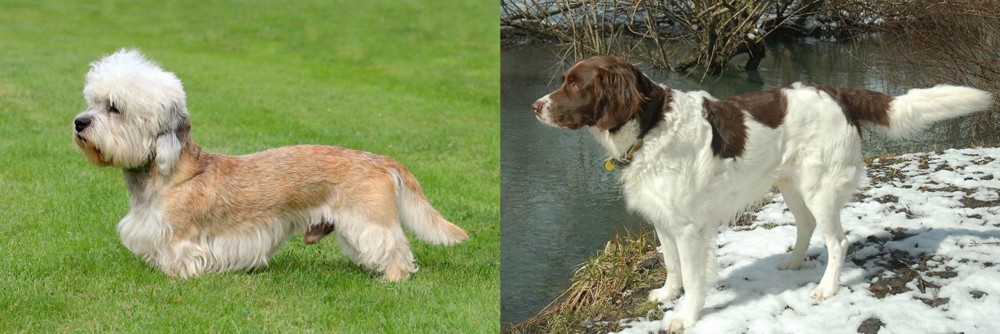 Dandie Dinmont Terrier is originated from United Kingdom but Drentse Patrijshond is originated from Netherlands. Dandie Dinmont Terrier may grow 35 cm / 13 inches shorter than Drentse Patrijshond. Dandie Dinmont Terrier may weigh 19 kg / 41 pounds lesser than Drentse Patrijshond. Both Dandie Dinmont Terrier and Drentse Patrijshond has same life span. Both Dandie Dinmont Terrier and Drentse Patrijshond has almost same litter size. Both Dandie Dinmont Terrier and Drentse Patrijshond requires Moderate Maintenance.
Dandie Dinmont Terrier is originated from United Kingdom but Drentse Patrijshond is originated from Netherlands. Dandie Dinmont Terrier may grow 35 cm / 13 inches shorter than Drentse Patrijshond. Dandie Dinmont Terrier may weigh 19 kg / 41 pounds lesser than Drentse Patrijshond. Both Dandie Dinmont Terrier and Drentse Patrijshond has same life span. Both Dandie Dinmont Terrier and Drentse Patrijshond has almost same litter size. Both Dandie Dinmont Terrier and Drentse Patrijshond requires Moderate Maintenance.
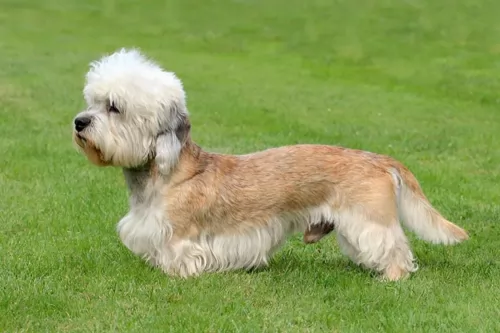 The rough coated Dandie Dinmont Terrier originates from Scotland. They were used centuries ago for hunting otters and badgers.
The rough coated Dandie Dinmont Terrier originates from Scotland. They were used centuries ago for hunting otters and badgers.
There are theories that exist that the dog is a cross between Scottish- and Skye Terriers while others believe there must be some Dachshund in the mix because of the long body of the Dandie Dinmont Terrier.
The Dandie Dinmont Terrier was first recorded as a distinct breed in the late 1600s. The British Dandie Dinmont Terrier Club was formed in 1875 while the American Kennel Club recognized the Dandie in 1886.
 The Drentse Patrijshond came about in the 1930-1950s. The breed developed from pointing dogs which originated in Spain, arriving in the Netherlands in the 16th century and being known as Partridge dogs.
The Drentse Patrijshond came about in the 1930-1950s. The breed developed from pointing dogs which originated in Spain, arriving in the Netherlands in the 16th century and being known as Partridge dogs.
The eastern part was known as the Province of Drenthe, and it is this area where these Partridge dogs were bred exclusively, not being mixed with other unknown breeds.
After World War II the Drentse Patrijshond was also recognized by the FCI. It was a popular dog in the Netherlands and the breed was also recognized by the Dutch Kennel Club in 1943. The Dretse’s popularity grew in other European countries too. In the 1960s some of the dogs entered the United States and in 2008 the Drentse Patrijshond Club of North America was established.
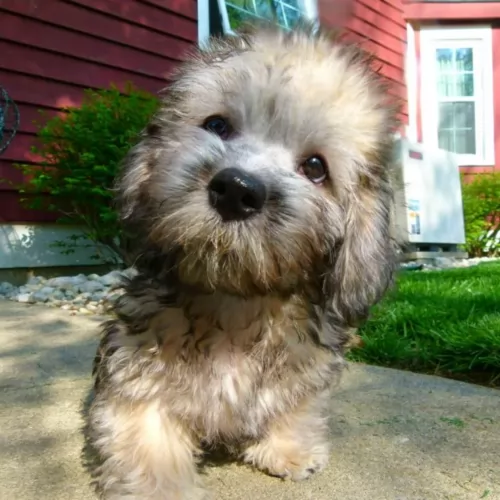 The Dandie Dinmont Terrier is a small dog who stands between 20 – 28cm at the withers and weighs between 8 and 11kg. He is recognizable by his fluffy head of hair.
The Dandie Dinmont Terrier is a small dog who stands between 20 – 28cm at the withers and weighs between 8 and 11kg. He is recognizable by his fluffy head of hair.
He actually has quite a unique look with his long body and slightly over-sized head. He has floppy ears and a long tail. His coat is quite unusual too in that it can be silky and long around the face, legs and belly, while the topcoat is fairly shortish and crisp. His coat color is fawn to brown or reddish. He isn’t a heavy shedder.
Known also as the Dandie, Charlie’s Hope Terrier, the Mustard and Pepper Terrier, the Dandie Dinmont makes an excellent family pet with his calm demeanor, being somewhat reserved around strangers.
He is an alert, intelligent little dog and will warn you of strangers coming into your space. He therefore makes a good watchdog. He is loving and loyal to his human family and will readily fit into life in the city or in the countryside.
They are good with children and pets but with his independent streak, he will require training and socialization if you want him to behave and be obedient.
 The Drentse Patrijshond is a medium to large sized dog standing between 55 and 63cm in height and weighing anything between 18 and 30kg. He is a working dog and known by other names such as Dutch Partridge Dog and Dutch Gundog among others.
The Drentse Patrijshond is a medium to large sized dog standing between 55 and 63cm in height and weighing anything between 18 and 30kg. He is a working dog and known by other names such as Dutch Partridge Dog and Dutch Gundog among others.
The coat of the dog is medium length and dense and is mostly white with reddish brown markings. People looking at him liken him to a spaniel, pointer or setter kind of dog. He is athletic and muscular with a long feathery tail, floppy ears and a brown nose with amber colored eyes.
The Drentsche Patrijshond is an amicable family dog who is relaxed and calm around other pets in the home as well as children. In fact it is the kind of dog that forms a strong bond with his human family, not liking to be left alone.
He is a lively, alert and playful dog with a tendency to be a bit stubborn but this is easily dealt with when he undergoes training and socialization. He is an adaptable dog, being able to fit into life in the city or the countryside, just so long as his beloved owners are close by. However, he is very active and will require an owner who will take time out to take him on walks or involve him in lots of outdoor activities.
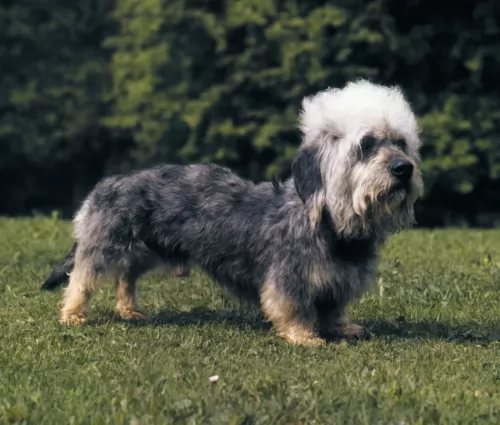 Your Dandie Dinmont is capable of being a wonderful companion. He loves spending time with his human family and is affectionate and loyal.
Your Dandie Dinmont is capable of being a wonderful companion. He loves spending time with his human family and is affectionate and loyal.
The small Dandie is able to fit into life in the city or country, just so long as he has his human family with him. Because he comes from Terrier dogs, he is no push-over though and he has an independent streak which will benefit from training and socialization.
Make sure you give this small dog of yours plenty of love and good care and you will find that you have a loyal, devoted friend in him.
 The Drentse Patrijshond is a breed of dog that is particularly human orientated – just loving being around his human family.
The Drentse Patrijshond is a breed of dog that is particularly human orientated – just loving being around his human family.
He forms a deep bond with those that care for him and he can’t bear to be separated from his human family. The dog has always had a strong hunting instinct but these days this sweet, loyal dog is much more a devoted family pet who is more than happy to come indoors and make himself at home among his family members.
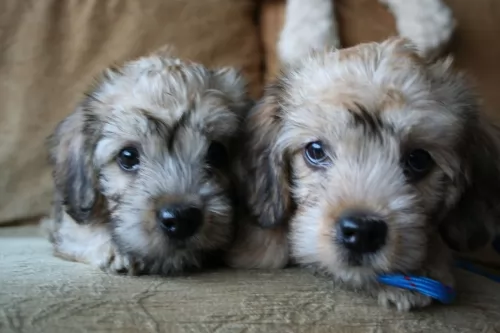 Your pet Dandie Dinmont is a robust little dog who, with good care, can live to be anything between 12 to 15 years of age.
Your pet Dandie Dinmont is a robust little dog who, with good care, can live to be anything between 12 to 15 years of age.
With every dog breed there will be health concerns, and these can include illnesses such as epilepsy as well as hypochondroplasia. All dogs have the potential to fall prey to health problems, and getting your pet from a reputable breeder can help to ensure you eliminate some of these diseases.
This small dog has a long body which means he can be affected by spinal problems. Genetics and body shape play a large role. Intervertebral disc disease is a condition where the cushioning discs between the vertebrae of the spinal column herniate into the spinal cord space. The discs press on the nerves and pain and paralysis can follow.
 The Drentse is a fairly healthy dog breed, with a life span of 12 to 15 years. No matter how healthy your dog, there will always be some health issues it may face. Environmental factors and diet can play an important part in his wellbeing.
The Drentse is a fairly healthy dog breed, with a life span of 12 to 15 years. No matter how healthy your dog, there will always be some health issues it may face. Environmental factors and diet can play an important part in his wellbeing.
Health concerns with this breed can include progressive retinal atrophy, hip dysplasia as well as hereditary stomatocytosis. This is a disorder that affects the dog’s cells walls.
Too much fluid gets into the cells and this damages red blood cells. Some breeds are more prone to this disorder, and the Drentse Patrijshond is one. It is an hereditary disorder that results in chronic anemia and liver disease.
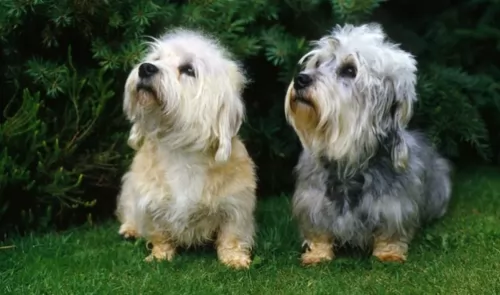 The Dandie doesn’t require as much exercise as some other dog breeds but you want to make sure he goes with you on your walks, or you play ball with him in the garden. You don’t want to see a small dog like this becoming obese as it can herald in a host of health problems.
The Dandie doesn’t require as much exercise as some other dog breeds but you want to make sure he goes with you on your walks, or you play ball with him in the garden. You don’t want to see a small dog like this becoming obese as it can herald in a host of health problems.
The Dandie Dinmont Terrier doesn’t shed a hang of a lot but still, you will need to brush him twice a week to get rid of those loose hairs. Also, the coat will require stripping twice a year. Some dog owners who prefer a low maintenance breed might not like knowing this, but it is a necessary part of his grooming. There are some dog owners who cut the hair rather, but then the texture of the coat will change. This is only important to know if you want to show your Dandie. Other Dandie owners take their pets to a professional groomer for clipping.
Because the Dandie has floppy ears and a lot of hair around the face and ears, you will need to check his ears for dirt and wax build-up as these can cause an ear infection. If you’re nervous to be going inside your dog’s ears, the vet or the dog groomer can show you how.
Also, little dogs like this are prone to tooth decay, and you will need to brush his teeth 2 or 3 times a week. This is because plaque and tartar buildup can cause mouth infections which contribute to other diseases within the body.
 This dog is quite a heavy shedder, but even so, he won’t need professional grooming – just a good brushing twice a week.
This dog is quite a heavy shedder, but even so, he won’t need professional grooming – just a good brushing twice a week.
The teeth will need to be brushed 2 or 3x a week and because he has floppy ears, these will need to be checked for infection. It’s a good idea to clean them with some special dog ear cleanser, but if you’re not sure how, your vet or a professional groomer can do it for you.
Cut your dog’ nails, but once again if you think you might cut into the quick of the nail, causing bleeding and pain, a professional groomer can do it for you.
The Drentsche Patrijshond will require quality dry dog food. Speak to your vet about the best kibble that ensures your pet gets his full quota of vitamins and minerals. Add in cooked brown rice, vegetables and chicken from time to time and include some raw meat wherever possible. Adding in some raw meat helps to stave off dry, red, irritated skin. Your pet will also need access to fresh, cool water day and night.